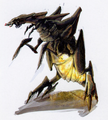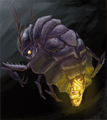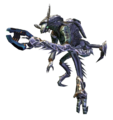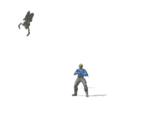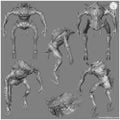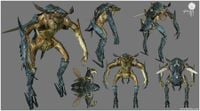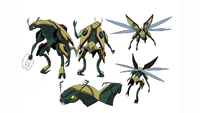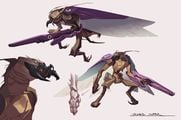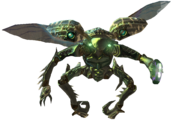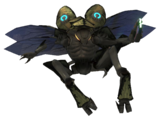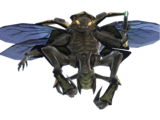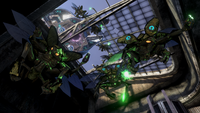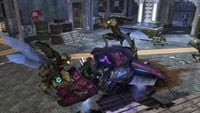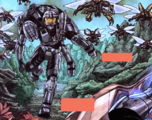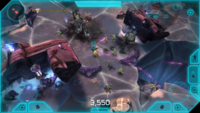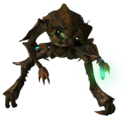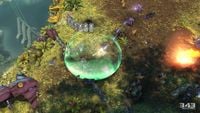Yanme'e: Difference between revisions
From Halopedia, the Halo wiki
No edit summary |
(→Description: Added info about Drone blood from Official Spartan Field Manual.) |
||
| (717 intermediate revisions by more than 100 users not shown) | |||
| Line 1: | Line 1: | ||
{{ | {{Status|Canon}} | ||
{{ | {{Center|''This article is about the xeno-arthropodal species. For other uses of Drone, see [[Drone|here]].''}} | ||
{{ | {{Species infobox | ||
|name=Yanme'e | |name=Yanme'e | ||
| | |image=[[File:Yanmee H2A.png|300px]] | ||
|latin=''Turpis rex'' | |||
|classification=Arthropod | |||
|subspecies= | |||
|diet=Carnivorous | |||
|height={{Convert|177.8|cm|ft}}–{{Convert|205.8|cm|ft}}<ref name="ENC">'''[[Halo Encyclopedia (2009 edition)]]''', ''pages 148-149''</ref><ref name="vis">'''[[Halo: The Essential Visual Guide]]''', ''page 51''</ref> | |||
|weight={{Convert|169.7|lb|kg|disp=flip}}–{{Convert|279.9|lb|kg|disp=flip}}{{Ref/Reuse|ENC}}{{Ref/Reuse|vis}} | |||
|distinctions=Xeno-arthropodal morphology, beetle-like wings and exoskeleton. Flight-capable. Vestigial third pair of limbs | |||
on abdomen | |||
|lifespan= | |||
|homeworld=[[Palamok]] | |homeworld=[[Palamok]] | ||
| | |techlevel=Native Tier 4/Adopted Tier 2{{Ref/Reuse|bestiarum}} | ||
| | |notable-person=*"[[Hopalong]]" | ||
| | *[[Tek'ch]] | ||
|othernames=*Drone<ref name="cftu">'''[[Halo 2]]''', ''[[Conversations from the Universe]]''</ref> | |||
*Roach{{Ref/Reuse|cftu}} | |||
*Bug/Buggers{{Ref/Reuse|cftu}} | |||
*[[ | |languages= | ||
| | |||
*Roach | |||
*Bug/Buggers | |||
}} | }} | ||
The | {{Quote|The flying Yanme'e, simply called the Drones by some, tend to a hivelike society, eusocial and separated by castes, each with its own tasks, subject to the will of a matriarchal queen.|From the [[Zo Resken|Prophet of Clarity]]'s ''[[Notes on the History of the Covenant]]''<ref name="bc186">'''[[Halo: Broken Circle]]''', ''page 186''</ref>}} | ||
The '''Yanme'e''' ([[Latin]], ''Turpis rex'', translated to "dishonorable king"<ref name="Beast">[http://carnage.bungie.org/haloforum/halo.forum.pl?read=865756 '''halo.bungie.org''': ''Bestiarum Latin names translated'']</ref>), referred to by some individuals as '''Drones'''{{Ref/Reuse|bc186}} or '''Buggers''',{{Ref/Reuse|cftu}} are a race of [[Sentience|sentient]], carnivorous, flight-capable insectoids.<ref name="waypointarticle">[https://www.halowaypoint.com/en-us/universe/species/yanme-e-drones '''Halo Waypoint''': ''Yanme'e'']</ref> The Yanme'e were one of the species that composed the religious hegemony known as the [[Covenant]], having become the body's second client species in [[1112|1112 CE]].<ref name="bestiarum">'''[[Halo 3]]''', ''[[Bestiarum]]''</ref> In combat, the Yanme'e served as mechanics and soldiers, often using their ability to fly to carry out ambushes on enemies of the Covenant.{{Ref/Reuse|ENC}} | |||
== | ==History== | ||
The Yanme'e | The Yanme'e evolved from winged tree-dwelling arthropods on [[Palamok]] which had developed complex [[Wikipedia:motor skill|motor skills]] due to a flexible appendage made up of chitin that functioned as an opposable thumb. Eventually, the species developed higher levels of technology that ultimately led to the evolution of the Yanme'e species, due to societal coordination and cooperation.{{Ref/Reuse|waypointarticle}} The [[Forerunner]]s noted that the Yanme'e were one of the few sapient, arthropodal species in the [[Milky Way]] galaxy that were competent enough to attain tool-making and technological skills.{{Ref/Reuse|bestiarum}} | ||
The Yanme'e | ===The Covenant=== | ||
Eventually, the Yanme'e became an interstellar-faring, [[Technological Achievement Tiers#Tier 4: Space Age|Tier-4]] species. The Yanme'e first encountered the [[Covenant]] in the year [[1112]], while the Covenant was searching for Forerunner artifacts.<ref>'''Halo Encyclopedia: The Definitive Guide to the Halo Universe''', ''page 159'' (2011 edition)</ref> Initially, first contact was violent as the Yanme'e attempted to resist the alien invaders. Both sides took heavy casualties, but surprisingly,{{Ref/Reuse|bestiarum}} it was the Covenant who fared worse in these battles due to the sheer amount of Yanme'e combatants.{{Ref/Reuse|ENC}} However, the Covenant was unwilling to [[glassing|glass]] Palamok, as the [[San'Shyuum]] believed that Palamok's hives could be guarding Forerunner relics on the planet's surface. The San'Shyuum eventually found an effective way to communicate with the Yanme'e, and subsequently incorporated them into the Covenant by way of a treaty in an effort to prevent a prolonged war. Exploration of Palamok following the war provided no evidence of former Forerunner artifacts on the planet.{{Ref/Reuse|waypointarticle}} The San'Shyuum were quick to make use of their talent for repairing machinery, and employed them as mechanics on Covenant vessels.<ref>'''Halo Encyclopedia: The Definitive Guide to the Halo Universe''', ''page 31''</ref> An assembly of Yanme'e [[Yanme'e Queen|Hive Queens]] was formed, and they conscripted members of the drone caste into the [[Covenant military]].{{Ref/Reuse|bc186}} | |||
The Yanme'e | The Yanme'e were one of the first species to make contact with [[humanity]], on the human colony of [[Harvest]] in [[2525|February 2525]]. They were first identified by the [[United Nations Space Command]] in the [[First Battle of Harvest#Siege on Gladsheim|siege]] of [[Gladsheim]], a small town on Harvest.<ref>'''[[Halo: Contact Harvest]]''', ''page 286''</ref> During the later fight on the [[Tiara]], several Yanme'e killed the [[Huragok]] [[Lighter Than Some]] out of jealousy, causing the enraged [[Unggoy]] [[Deacon]] [[Dadab]] to slaughter them in revenge.<ref>'''[[Halo: Contact Harvest]]'''</ref> | ||
After the [[Hierarchs]] declared war on humanity, Yanme'e were used as military combatants against UNSC forces. They were deployed during many major conflicts, including the [[Fall of Reach]]. During the [[Battle of Meridian]], five or six Yanme'e were deployed by an {{Pattern|Ceudar|heavy corvette}} to finish off the survivors of a boat it had fired upon. [[Dorian Nguyen]] was able to kill one by slamming it with a guitar, crumpling its wings and sending the Yanme'e into the sea. Dorian managed to escape, but the Yanme'e slaughtered the hundreds of other people on the boat, including Dorian's friends and bandmates.<ref>'''[[Halo: Battle Born]]''', ''Chapter 4''</ref> | |||
During the [[Battle for Earth]], they boarded [[orbital defense platform]]s along with other Covenant infantry.<ref>'''Halo 2''', campaign level, ''[[Cairo Station]]''</ref> When the Covenant made landfall in [[New Mombasa]], the Yanme'e immediately established a large hive in the [[Superintendent|Superintendent's]] data center.{{Ref/Reuse|Datahive}} | |||
During the [[Great Schism]], the Yanme'e joined the San'Shyuum and the [[Jiralhanae]].<ref>'''Halo 2''', campaign level, ''[[Uprising]]''</ref> Many were present as combatants during the [[Battle of Installation 00]].<ref>'''Halo 3''', campaign level, ''[[The Ark (level)|The Ark]]''</ref> | |||
== | ===Post-war=== | ||
After the Human-Covenant War, many Yanme'e happily returned to their [[Napret system|home system]].{{Ref/Reuse|waypointarticle}} In [[2554]],<ref name="catalog">[https://forums.halowaypoint.com/yaf_postsm2994218_Catalog-Interaction.aspx#post2994218 '''Halo Waypoint''': ''Catalog Interaction (Page 43)'']</ref> Many Yanme'e served in [[Tem'Bhetek's faction]] which attempted to use the [[Prototype Halo installation]] to destroy [[Sanghelios]] and the Sangheili. Many were killed by [[Rtas 'Vadum]] and [[Tul 'Juran]] after mortally wounding [[Tem'Bhetek]] with the remaining ones trying desperately to get to [[Boru'a'Neem]] to stop him from firing the miniature Halo again. They were killed when Tem destroyed the installation.<ref>'''[[Halo: Shadow of Intent]]'''</ref> A large number of Yanme'e were present during the [[Battle of Draetheus V]], serving in [[Merg Vol]]'s [[Merg Vol's Covenant|Covenant]].<ref>'''[[Halo: Spartan Assault]]'''</ref> Many more served in [[Jul 'Mdama]]'s [[Jul 'Mdama's Covenant|Covenant]] during the [[Battle of Installation 03]].<ref>'''[[Halo: Spartan Strike]]'''</ref> For the most part, though, the Yanme'e mostly kept to themselves. The UNSC attempted a "don't poke the nest" policy toward the Yanme'e, attempting to avoid direct provocation while the UNSC focused on more immediate threats within the [[Covenant remnants]]. This policy was largely successful, though there were exceptions.<ref>'''[[Halo: New Blood]]''', ''Chapter 16''</ref> | |||
When [[Cortana]] made her offer at the beginning of the [[Created conflict]] to the species of the galaxy, she did not include the Yanme'e in her list of species that she offered to fall under her protection. Upon hearing her message, Spartan [[Edward Buck]] noted her exclusion of the Yanme'e and didn't blame Cortana for excluding them as the Yanme'e creeped him out.<ref>'''[[Halo 5: Guardians]]''', campaign level ''[[Guardians]]''</ref><ref>'''[[Halo: Bad Blood]]''', ''page 5''</ref> | |||
Yanme'e exoskeletons are | ==Description== | ||
===Anatomy and physiology=== | |||
[[File:Drones1.jpg|thumb|250px|Diversity of Yanme'e protectors hanging asleep from a [[Kez'katu-pattern Phantom|Phantom]].]] | |||
{{Quote|They're built kinda like beetles, and they flit around on twinned pairs of transparent wings that flap faster than you can see.|[[Edward Buck]] on the Yanme'e<ref name="nb69">'''Halo: New Blood''', ''pages 69-70'' (Google Play edition)</ref>}} | |||
The Yanme'e share many similarities with [[Earth]]’s beetles and colonial insects. They are bipedal arthropods with hard exoskeletons made from a glossy chitinous substance, as well as two pairs of veined wings. These adaptations are a response to the high gravity of the Yanme'e homeworld, [[Palamok]]; their shells allow them to withstand hard falls, and the thick atmosphere of Palamok allows the winged Yanme'e to achieve just enough lift to perform fluttering leaps or naturally short bursts of flight.<ref name="enc309">'''Halo Encyclopedia: The Definitive Guide to the Halo Universe''', ''page 309'' (2011 edition)</ref> In lower-gravity environments, Yanme'e are capable of using their wings for actual aerial maneuvering, but the weight of their exoskeletons prevent them from flying.{{Ref/Reuse|ENC}} When the [[Covenant]] discovered this natural ability, scientists extended their flight capabilities by fixing gravity-dampening modules to their bodies. The module adjustment gave the Yanme'e the ability to take flight freely, and the species proved to be impressive fliers—particularly on worlds that had less gravity than Palamok.{{Ref/Reuse|waypointarticle}} Yanme'e are also impressively strong, despite their frail appearance. They can also be seen lifting their enemies off the ground to impressive heights.{{Ref/Reuse|nb69}}<ref name="h3 crow">'''Halo 3''', campaign level, ''[[Crow's Nest]]''</ref> | |||
Unlike Earth insects, which have three body segments, Yanme'e have five: a head, a cephalothorax, a thorax, a pelvis, and an abdomen. The head supports a pair of feathery sensory antennae and luminous,<ref>'''Halo: Contact Harvest''', ''page 202''</ref> compound eyes that give the species adept vision.<ref name="ch267">'''Halo: Contact Harvest''', ''page 267''</ref> The mouth consists of several sets of mandibles like those found on insects. Their hands sport opposable thumbs and three dextrous fingers. Yanme'e are "polydextrous", meaning that they are capable of using both their prehensile hands and feet to operate tools. The primary pair of legs are attached to a pelvis-like structure, while a smaller pair is attached to the abdomen. Although they generally use their primary set of limbs, Yanme'e can use this last set of limbs to operate weapons, grasp enemies, or latch on to ceilings and hang down vertically during sleep.{{Ref/Reuse|waypointarticle}}<ref>'''Halo 3: ODST'''</ref> The Yanme'e have extremely sharp claws, located on all limbs,<ref>'''Halo: Contact Harvest''', ''page 371''</ref> that they can use to defend themselves if necessary, though they prefer to avoid close-quarters combat.<ref name="ENC159">'''Halo Encyclopedia: The Definitive Guide to the Halo Universe''', ''page 159''</ref> Yanme'e are a carnivorous species. Early in their history, the Yanme'e developed and bred types of feral livestock for food.{{Ref/Reuse|bestiarum}} | |||
There | There is essentially no apparent sexual dimorphism between male and female Yanme'e. Yanme'e exoskeletons are brightly colored, with different hues representing different functions or class.{{Ref/Reuse|waypointarticle}} Adolescent, or pupal, Yanme'e have translucent shells that glow luminescent yellow and orange. Almost nothing is known about the Yanme'e life cycle beyond the fact that the queen lays eggs. It is possible that the Yanme'e go through a complete metamorphosis including an egg, larva, pupae and adult stage, as many terrestrial insects and arthropods do. | ||
== | To [[human]]s, Yanme'e have a natural musty odor.{{Ref/Site|URL=http://halo.bungie.net/projects/odst/guide.aspx|Site=Bungie.net|Page=Halo 3 ODST : Field Guide - Drone|D=25|M=05|Y=2013|LocalArchive=Archive:Bungie.net/Halo 3: ODST: Field Guide#Enemies}} Yanme'e blood is known to display a range of bioluminescent colors, which varies based on their diet.{{Ref/Book|OSFM|Page=170}} | ||
===Intelligence=== | |||
Yanme'e are a eusocial species, and therefore their intelligence is geared toward working in concert with large groups. They can accomplish tasks swiftly and efficiently when working together, and their knowledge of machinery is rivaled only by the [[Huragok]]. However, they lack individuality because of their hive lifestyle; their instincts and societal conditioning suppress creative thought and encourage total obedience to authority. They do not appear to experience higher emotions; it is known that they are able to feel jealousy, as seen when they killed the Huragok [[Lighter Than Some]] because he usurped their role as technician on board ''[[Rapid Conversion]]''.<ref name="ch369">'''Halo: Contact Harvest''', ''page 369''</ref> Yanme'e were allegedly incapable of feeling fear.<ref name="bungiestates">[http://halo.bungie.net/Stats/GameStatsCampaignHalo3.aspx?gameid=20779 '''Bungie.net:''' ''Stats'']</ref> Despite their hive-minded nature, Yanme'e are still individually quite intelligent.{{Ref/Reuse|nb69}} | |||
Certain Yanme'e are unable to function in a hive society due to a form of personality disorder; these "[[Unmutuals]]" are capable of independent thought and tactical planning, although they tend to be extremely violent and aggressive. However, some of these Yanme'e appear to be very intelligent independently.<ref name="BI26">'''[[Halo: Evolutions]]''', "[[Blunt Instruments]]", ''page 26''</ref> [[Hopalong|One]] individual was able to tamper with the inner circuitry of a [[UNSC]] [[Interrogator]] and allowed the device to translate the Yanme'e language into [[English]] in a matter of seconds.<ref name="BI13">'''Halo: Evolutions''', "Blunt Instruments", ''page 13''</ref> | |||
==Culture== | |||
The Yanme'e are an insectoid species with a hive-minded social structure. Their society consists of reproductive [[Yanme'e Queen|queen]]s, reproductive male drones and non-reproductive workers and soldiers. It is unknown if the soldier and worker caste is specific to one gender or another, but it is confirmed that the Yanme'e worker [[Hopalong]] was a male. Because of their eusocial nature, they can be extremely dogmatic and hive-minded,{{Ref/Reuse|ch267}} a trait that may have made for an easy conversion into the Covenant hierarchy. The Hive Queen is the center of Yanme'e society and culture, to the point of her being the reason for the species' technological progress and advancement. This includes most major advances in science and other technology that typically results in emphasized protection and augmentation of the queen and the hives.{{Ref/Reuse|waypointarticle}} | |||
Yanme'e obeyed the commands of the higher castes without question in the [[Covenant]], but had little concept of religion and did not partake in social norms due to communication difficulties with other species. They referred to the [[San'Shyuum]] as "Queens", a remnant of their former hive lifestyle.{{Ref/Reuse|bestiarum}} They did not interact with other Covenant member races except to trade resources and to serve in the military, where they typically serve as mechanics and repair crews on warships. Although highly skilled with technology, they aren't nearly as effective as [[Huragok]]; this has often brought them into a state of rivalry with [[Huragok]], and in jealousy, the Yanme'e aboard ''[[Rapid Conversion]]'' even killed a Huragok named [[Lighter Than Some]] when it was assigned all of their former tasks.{{Ref/Reuse|ch369}} | |||
===Role within the Covenant=== | |||
[[File:HR Sinoviet Drones.jpg|thumb|250px|A Yanme'e combat swarm on [[Reach]].]] | |||
Yanme'e were initially conscripted into the Covenant only as mechanics and laborers. The Yanme'e were not as technically skilled as the [[Huragok]], but they still proved to be incredibly competent mechanics and were efficient at general maintenance.<ref>'''Halo Encyclopedia: The Definitive Guide to the Halo Universe''', ''page 121''</ref> After years of serving in only custodial positions within the [[Covenant military]], the Covenant had eventually developed numerous combat roles for the Yanme'e—largely due to their impressive flight capabilities.{{Ref/Reuse|waypointarticle}} They are typically used for surprise aerial ambushes and assaults, such as catching infantrymen off guard and diverting their attention so that their Covenant allies may gain the upper hand. The Yanme'e physiology made the species well-suited in infiltration roles.{{Ref/Reuse|bungiestates}} Yanme'e are quite capable of using most light Covenant weaponry, and depending on their rank may wield [[Type-25 plasma pistol|plasma pistol]]s, [[Type-33 Needler|Needler]]s, and [[Okarda'phaa-pattern plasma rifle|plasma rifle]]s. The limb dexterity of the Yanme'e allows them to have competent aiming skills while in flight or while they are climbing over a structure. In addition, their speed and adept sight made the Yanme'e one of the most threatening infantry units in the entire Covenant military.{{Ref/Reuse|bestiarum}} | |||
Yanme'e were very territorial over the tasks they were assigned to. Although the Yanme'e would respect the Covenant's [[Covenant religion|religious]] principles and would loyally obey their [[Sangheili]] and San'Shyuum commanders, they had no particular passion for the Covenant religion or desire to follow Covenant social normalities. Due to their lack of individual initiative, the Yanme'e remained low in the Covenant hierarchy, often commanded on the battlefield by Sangheili, [[Jiralhanae]], or [[Kig-Yar]].{{Ref/Reuse|ENC159}} Due to their low position, the Yanme'e were not represented on the [[High Council]], but their interests were instead vetted by the [[Ministry of Concert]].<ref>'''Halo: Contact Harvest''', ''page 150''</ref> | |||
During large-scale ground engagements, Yanme'e have a tendency to entrench themselves and establish hives within enemy territory, as seen during the [[Fall of Reach]] and the [[Battle of New Mombasa|conflicts]] in [[New Mombasa]]. This can make them a persistent threat, as the hives provide a constant supply of Yanme'e to reinforce occupying Covenant troops.<ref name="Datahive">'''[[Halo 3: ODST]]''', campaign level, ''[[Data Hive (Level)|Data Hive]]''</ref> | |||
Yanme'e | |||
===Hives=== | |||
[[File:Hives 3.jpg|thumb|250px|A Yanme'e hive under [[New Mombasa]].]] | |||
{{Quote|The first thing the Drones usually do when they set up in a place is build a hive made of spit, shit, and whatever else they can find lying around. It's how they mark a conquered area as their own.|Edward Buck{{Ref/Reuse|nb69}}}} | |||
Yanme'e have the ability to form fully functional hives at incredibly fast rates; during the [[Battle of New Mombasa]], the Yanme'e generated a vast hive structure within the city's data center within hours. Hives are primarily constructed from a collection of mud, wood, and cellulose materials that is then mixed with Yanme'e excretions, which are formed into large stalactite-shaped structures. Yanme'e are able to establish hives in any location where sufficient raw material was available. However, hives are most commonly found underground or in vast jungle canopies, like the ones that cover a majority of [[Palamok]]'s surface. The Yanme'e have also formed densely packed hives within the massive geological structures on Palamok's [[moon]]s of [[Ka'amoti]] and [[Oquiu]].{{Ref/Reuse|waypointarticle}} A defining characteristic of Yanme'e hives is that they radiate heat to their surroundings from vent-like openings, elevating the temperature over a large area.{{Ref/Reuse|Datahive}} | |||
During their service with in the Covenant, Yanme'e that are deployed in combat roles are often ordered to create temporary, makeshift hives that allowed the rest of the Covenant military to easily access enemy territory. The hives served as Covenant strongholds for invading forces, often hidden within enemy territory on cavernous ceilings or underground.{{Ref/Reuse|waypointarticle}} Hives were established on [[Earth]] and [[Verge]] by the Yanme'e during the [[Human-Covenant War]].{{Ref/Reuse|Datahive}}<ref name="BI21">'''Halo: Evolutions''', "Blunt Instruments", ''page 21''</ref> They would often use these hives to show that they had conquered an area on a world.{{Ref/Reuse|nb69}} | |||
' | |||
===Language=== | |||
The Yanme'e language is a cacophony of high-pitched clicking or whining from the rubbing of their waxy, leaf-like wings.<ref>'''Halo: Contact Harvest''', ''page 311''</ref> They are also known to communicate sonically with loud shrieks and screeches, as well as through the use of pheromones.{{Ref/Reuse|ENC}}{{Ref/Reuse|waypointarticle}} Combat units will usually elect an attaché to serve as a translator, learning how the other races communicate and relaying the relevant information to the other Yanme'e. However, the attaché still does not socialize with other species, only learning enough about their allies to keep the other Yanme'e organized and informed.{{Ref/Reuse|ENC159}} By [[2552]], the Yanme'e language was still not completely translated by the [[Office of Naval Intelligence]] due to lack of information about the species. ONI's [[Interrogator]] [[translation software]] was only capable of poorly imitating Yanme'e clicks, but the output was unintelligible to the species.{{Ref/Reuse|BI13}} | |||
==Castes== | |||
The Yanme'e race, inclining towards a hive-like and eusocial society, are divided by several castes. Most individuals fall into one of the three main, distinct Yanme'e castes: domestic, worker, or protector. The colorations of the Yanme'e shell will indicate its caste, and function within the caste. All castes are subservient to the [[Yanme'e Queen|Hive Queen]].{{Ref/Reuse|bc186}}{{Ref/Reuse|waypointarticle}} | |||
===Hive Queen=== | |||
{{Main|Yanme'e Queen}} | |||
The Hive Queen is the central figure of a hive. Her primary role, as with [[Wikipedia:ant|ants]] and [[Wikipedia:bee|bees]], is to propagate the species. The queen serves as the leader of the Yanme'e species. The Yanme'e lead an aggressively matriarchal society, with the other castes of the Yanme'e serving the queen and carrying out her orders to ensure the preservation of the hive. Yanme'e queens are responsible for the species reproduction and way of life, leading to the well-being of a queen being the uppermost importance of a hive.{{Ref/Reuse|bc186}}{{Ref/Reuse|waypointarticle}} The queen is substantially larger than the other castes of the race, with a distended, egg-producing abdomen and thick legs.<ref name="ch381">'''Halo: Contact Harvest''', ''page 381''</ref> | |||
===Protector caste=== | |||
Similar in function to the soldier caste within many [[Earth]]-based insect species, the protector caste was artificially merged with the worker caste by the [[Covenant]] following the Yanme'e's joining.{{Ref/Reuse|waypointarticle}} The protector caste was used as the Yanme'e military, within hive society and in the [[Covenant military]]. Within the protector caste, there appear to be many ranks. [[Yanme'e Minor|Minor]]s are the most common form and have a very low position in Covenant society. [[Yanme'e Major|Major]]s likely represent higher class in the protector caste, followed by [[Yanme'e Ultra|Ultra]]s. Protectors have most often been seen wielding [[Plasma pistol|Plasma pistols]] but may also carry [[Type-33 Needler|Needlers]].<ref>'''[[Halo: Reach]]'''</ref> | |||
===Worker caste=== | |||
The worker caste is similar to the worker castes of similar function found within many eusocial Earth-based insect species. This caste was artificially merged with the protector caste by the Covenant, following the species' incorporation into the Covenant.{{Ref/Reuse|waypointarticle}} The caste is likely responsible for creating the hives and were likely employed by the Covenant in custodial positions. When the Covenant forced Yanme'e workers into combat positions on ''[[Rapid Conversion]]'', several individuals became unusually clumsy and flustered; they became confused over the change in task.{{Ref/Reuse|ch267}} | |||
== | ===Other castes=== | ||
Yanme'e males that are unable to fit in with the caste system or are born with destructive tendencies are known as [[Unmutuals]], and are exiled from hives.{{Ref/Reuse|waypointarticle}} These are Drones unable to work in concert with the rest of the hive, and have in fact been known to go on rampages, destroying nests, smashing eggs, even murdering other adult Yanme'e. They are generally imprisoned to prevent them from communicating with the rest of the hive, and on at least one known occasion have been sent to mine [[Helium|helium-3]] on planets captured by the Covenant. Yanme'e in these penal colonies are often guarded by Kig-Yar who may work them to death. On one occasion, a Kig-Yar actually removed the legs of a Drone whom [[SPARTAN-II Program|SPARTAN]] [[Team Black]] named [[Hopalong]]. He helped the SPARTANs infiltrate their objective, deceiving them long enough to release the rest of the Drone prisoners.{{Ref/Reuse|BI26}} | |||
The domestic caste forms another large division within the Yanme'e caste structure, but its functions remain unknown. It is likely related to the wingless males that serve the queens.{{Ref/Reuse|ch381}} | |||
==Homeworld and colonies== | |||
{{Main|Palamok}} | |||
The Yanme'e homeworld is Palamok, an [[Earth]]-like planet but twice the size with over twice the gravity (2.2 G). Palamok is a flat and geographically featureless world, with little tectonic or volcanic activity.{{Ref/Reuse|bestiarum}} The planet features a warm atmosphere and a stable environment.{{Ref/Reuse|enc309}} The planet's high gravity led to the Yanme'e evolving with hard shells that are able to absorb a large amount of damage. Due to their planet's high gravity, the Yanme'e are only capable of short bursts of flight on Palamok, though they can fly quite well in 1.0 G environments.{{Ref/Reuse|vis}} The Yanme'e have several colonies throughout the [[Napret system]], with [[Oquiu]] and [[Ka'amoti]] being the most prominent.{{Ref/Reuse|waypointarticle}} | |||
===' | ==Military structure== | ||
Yanme'e follow a similar [[Covenant rank structure|ranking system]] to that used by the rest of the Covenant. A number of ranks are divided into two categories; infantry{{Ref/Site|URL=https://halo.bungie.net/stats/halo3/careerstatsodst.aspx?player=Sniper%20X%20Remix#|Site=Bungie.net|Page=Halo 3: ODST Stats|D=23|M=7|Y=2019}} and leader.{{Ref/Book|EVG|Page=51}} Infantry are usually ill-armed and armoured, instead deployed in vast swarms to overrun enemy defenses from the air. Leaders are usually equipped with [[energy shielding]] and larger weapons such as {{Pattern|Okarda'phaa|plasma rifle}}s, and appear rarely on the battlefield to direct vast swarms of infantry. | |||
[[Image: | Yanme'e rank progression is often signified by physiological changes within the Yanme'e individual itself, signifying that age is a factor into Yanme'e promotions. The youngest [[Yanme'e Pupa|pupal]] Yanme'e glow with a soft yellow light, and are rarely seen outside of the hives in which they grow.{{Ref/Book|Id=H3ODSTguide|Halo 3: ODST Official Strategy Guide|Page=25}} These pupal-stage Yanme'e are extremely susceptible to gunfire, indicating that their carapaces are incapable of fending off attacks until fully-grown.{{Ref/Reuse|ODST}} Once out of the pupal stage, Yanme'e continue to grow, with the carapaces of Captains and Captain Majors becoming more protective and ornate{{Ref/Reuse|ODST}} while Majors and Ultras see the growth of "horns" on the head{{Ref/Game|Id=HR|HR}} - though some-observed Majors and Ultras exhibit the same lack of morphological change as a regular Minor.{{Ref/Game|Id=ODST|H3ODST}}{{Ref/Game|Id=H3|H3}} | ||
{| class="wikitable" | |||
! '''Rank''' | |||
! '''Image''' | |||
! '''Description''' | |||
|- | |||
! colspan="3"|'''Yanme'e Leaders''' | |||
|- | |||
|'''[[Yanme'e Queen]]''' | |||
|[[File:Enc22 Yanme'eQueen.jpg|150px]] | |||
|Queens are the leaders of Hives, responsible for the birth of new members of the Swarm. | |||
|-! colspan="3"|'''Yanme'e Leaders''' | |||
|- | |||
|'''[[Yanme'e Hiveward|Hiveward]]''' | |||
|[[File:H3ODST DroneCapMaj Crop 1.png|150px]] | |||
|The highest-known rank of the Yanme'e, Hivewards command vast numbers of Yanme'e and have been rarely seen on the battlefield outside of a hive. | |||
|- | |||
|'''[[Yanme'e Captain|Captain]]''' | |||
|[[File:H3ODST DroneCaptain Crop.png|150px]] | |||
|The lowest-known rank of Yanme'e leader, Captains regularly appear on the battlefield to command large units of infantry. | |||
|- | |||
! colspan="3"|'''Yanme'e Infantry''' | |||
|- | |||
|'''[[Yanme'e Ultra|Ultra]]''' | |||
|[[File:HR YanmeUltra 2.png|150px]] | |||
|An Ultra is considered the highest regular military rank for the species. They are distinguished by their blue and cyan or silver-white exoskeletons, along with paired forked horn-like structures on their head and cephalothorax. | |||
|- | |||
|'''[[Yanme'e Major|Major]]''' | |||
|[[File:H3ODST DroneMajor 2.jpg|150px]] | |||
|Majors can be distinguished by a light blue{{Ref/Reuse|ODST}} or brown-red exoskeleton and set of three horns{{Ref/Reuse|HR}}, though some may also appear identical to the Minors below them.{{Ref/Reuse|H3}} They typically command a small unit of 2-3 Minors.{{Ref/Reuse|ODST}} | |||
|- | |||
|'''[[Yanme'e Minor|Minor]]''' | |||
|[[File:HTMCC Avatar Drone 2.png|150px]] | |||
|Drone Minors are the lowest of the Drone ranks, signified by their lack of extra horns or carapace - and green colouration. | |||
|- | |||
|'''[[Yanme'e Pupa|Pupa]]''' | |||
|[[File:H3ODST DronePupa 2.png|150px]] | |||
|These Yanme'e are [[Wikipedia:Pupa|pupa]], and undergoing transformation. They are extremely weak and emit a soft glow; they are rarely seen outside of a hive. | |||
|} | |||
Drones | ==Production notes== | ||
[[File:H2 Concept DroneEngineer3.png|thumb|One of several concepts for the Drone Engineer featured in ''[[The Art of Halo: Creating a Virtual World]]''.]] | |||
The Drones have had a number of cut variants over the years. During the [[Development of Halo: Combat Evolved|development]] of ''[[Halo: Combat Evolved]]'', one such cut unit was the Drone Engineer. At this stage in development, the Drone Engineer was envisioned to take the role of the [[Huragok]] featured in later media; with early designs depicting the Engineer as a fusion of insectoid and cybernetic elements. A number of designs were produced along this theme, eventually evolving into the Engineer design ultimately cut from the game.{{Ref/Book|The Art of Halo: Creating a Virtual World|Page=46}} This design was later re-considered for ''[[Halo 2]]'', in which the Drone Engineer concept was brought back as a new flying infantry unit, while the "gas-bag" design of Engineer that was modelled (though not implemented) in ''Combat Evolved'' was also canonised as a separate entity in ''[[Halo: First Strike]]'', ''[[Halo Wars]]'' and ''[[Halo 3: ODST]]''. | |||
The | The drones went on to recieve considerable expansion in ''ODST'', seeing five rank variants introduced and a [[Data Hive|level]] set inside one of the Drones' hives. The same year's ''[[Halo Wars]]'' also intended to introduced Drones as a playable unit, though this was ultimately [[Cut Halo Wars units#Recon Drone|cut from]] the game. The "Recon Drone" would have served as the Covenant's scout unit, with no attack abilities. Another Drone unit was also cut from ''[[Halo 4]]''; this drone was intended to be a [[Yanme'e Sniper|sniper unit]] and was fully-concepted - though never implemented in the final game. | ||
==Trivia== | |||
{{Other languages | |||
|fr={{Tooltip|''Les Drones''|The Drones}} in all media.<br> | |||
{{Tooltip|''Les Vermines''|The Vermin}} (nickname) in ''Halo: Reach''<nowiki>'</nowiki>s manual. | |||
}} | |||
{{Linkbox|gallery=yes|gameplay=yes}} | |||
*The nickname "buggers" is likely a reference to the Formic race in the Orson Scott Card novel ''[[wikipedia:Ender's Game|Ender's Game]]''. Additionally, the Drones' native name, Yanme'e, could be based on the Japanese 蜻蜓 (''yanma''), meaning "large dragonfly". | |||
*The weight of a Drone averages around 77 kilograms, a reference of [[Bungie]]'s love of the number [[Seven|7]]. | |||
*During concept stages for ''Halo 3'', the Yanme'e were planned to have an animation in which they would [[:File:Bugger Animated.gif|carry away a Marine]].<ref>[http://halo.bungie.net/News/content.aspx?type=topnews&link=Animation_BillOBrien '''Bungie.net''': ''A Certain Sense of Movement'']</ref> This animation was cut from the final game but one does pick up a Marine for a short time at the beginning of the first swarm attack in [[Crow's Nest (location)|Crow's Nest]]. | |||
*In ''[[Halo: Reach]]'', when Drones are killed with a headshot, they explode, leaving behind only limbs. | |||
*In ''Halo: Reach'', Drones are not encountered in [[Firefight]] mode, unlike ''[[Halo 3: ODST]]''. | |||
*On the [[Bungie.net]] game stats for ''Halo: Reach'', Yanme'e are referred to as "Buggers" rather than their more common nickname, "Drones". | |||
*In [[Halo 3: ODST]], on the level [[Data Hive]], you can find multiple Yanme'e eating the corpses of deceased police officers. This is the only time we are presented with a Covenant species actively eating human flesh in any [[Campaign]] level, albeit multiple claims that numerous species among the [[Covenant]], predominantly [[Jiralhanae]], consume human flesh. | |||
==Gallery== | |||
===Development images=== | |||
<gallery> | |||
File:H2 Concept DroneEngineer.png|Concept art of the "Drone Engineer" for ''[[Halo 2]]''. | |||
File:H2 Concept DroneEngineer2.png|Another concept of the "Drone Engineer." | |||
File:H2-YanmeeDrone-EarlyRender.png|Early render of the Yanme'e in ''Halo 2''. | |||
File:Bugger Animated.gif|An animation cut from ''[[Halo 3]]''. | |||
File:HW_Drone_Sculpt.jpg|A sculpt of a Yanme'e, ultimately unused, intended for inclusion in ''[[Halo Wars]]''. | |||
File:HW_Drone_Textured.jpg|The final Yanme'e model, cut from ''Halo Wars''. | |||
File:Homecoming_Drone_Concept.png|Concept art of the Yanme'e for ''[[Halo Legends]]: [[Homecoming]]''. | |||
File:H4 - Yanme'e Sniper 2.jpg|Unused concept art for Yanme'e snipers for ''[[Halo 4]]''. | |||
</gallery> | |||
===Screenshots and artwork=== | |||
<gallery> | |||
File:H2-Yanme'eDrone.png|A Yanme'e in ''Halo 2''. | |||
File:Waypoint - Yanme'e.jpg|A Yanme'e in ''Halo 2''. | |||
File:Incoming32001200.jpg|A group of Yanme'e flying forward in [[Halo 2 (Windows Vista)|''Halo 2'' for Windows Vista]]. | |||
File:H3-Yanme'eDrone.png|A Yanme'e Minor in ''Halo 3''. | |||
File:Yanme'eInsectDrone.png|Another Yanme'e in ''Halo 3''. | |||
File:HTMCC-H3 DroneAttack 2.png|A swarm of Yanme'e in ''Halo 3''. | |||
File:H3 Drones and a ghost.jpg|A group of Yanme'e attempting to [[hijack]] a {{Pattern|Karo'etba|Ghost}} in ''Halo 3''. | |||
File:Bloodline Verge.png|Yanme'e in ''[[Halo: Bloodline]]''. | |||
File:HaloReach - Drone.png|A Yanme'e in ''[[Halo: Reach]]''. | |||
File:Yanme'e SpartanAssault.png|Yanme'e fighting [[SPARTAN-IV program|Spartan]] [[Edward Davis]] in ''[[Halo: Spartan Assault]]''. | |||
File:Yanmee H2A.png|A Yanme'e in ''[[Halo 2: Anniversary]]''. | |||
File:HSS-Gameplay-Regeneration.jpg|A Yanme'e in ''[[Halo: Spartan Strike]]''. | |||
File:Halo Rise of Atriox3.png|Yanme'e attacking [[Atriox]] and [[Decimus]] on the cover of ''[[Halo: Rise of Atriox#3]]''. | |||
</gallery> | |||
== | ==List of appearances== | ||
* | {{Col-begin}} | ||
* | {{Col-2}} | ||
* | *''[[Halo 2]]'' {{1st}} | ||
* | **''[[Conversations from the Universe]]'' {{Mo}} | ||
* | *''[[Halo 3]]'' | ||
* | **''[[Bestiarum]]'' | ||
* | *''[[Halo: Contact Harvest]]'' | ||
* | *''[[Halo 3: ODST]]'' | ||
* | *''[[Halo Legends]]'' | ||
* | **''[[Homecoming]]'' | ||
* | **''[[Origins]]'' | ||
* | *''[[Halo: Evolutions - Essential Tales of the Halo Universe]]'' | ||
**''[[Blunt Instruments]]'' | |||
* | **''[[Wages of Sin]]'' {{Im}} | ||
* | *''[[Halo: Blood Line]]'' | ||
*''[[Halo: Reach]]'' | |||
*''[[Halo: Spartan Assault]]'' | |||
*''[[Halo: Broken Circle]]'' | |||
*''[[Halo 2: Anniversary]]'' | |||
*''[[Halo: New Blood]]'' | |||
{{Col-2}} | |||
*''[[Halo: Spartan Strike]]'' | |||
*''[[Halo 5: Guardians]]'' {{Mo}} | |||
*''[[Halo: Shadow of Intent]]'' | |||
*''[[Halo: Ground Command]]'' {{Mo}} | |||
*''[[Halo Mythos]]'' | |||
*''[[Halo: Recruit]]'' {{C|Non-canonical appearance}} | |||
*''[[Halo: Rise of Atriox]]'' | |||
*''[[Halo: Bad Blood]]'' {{Mo}} | |||
*''[[Halo: Fireteam Raven]]'' | |||
*''[[Halo: Silent Storm]]'' | |||
*''[[Halo: Battle Born]]'' | |||
*''[[Halo: Lone Wolf]]'' | |||
*''[[Halo: Outpost Discovery]]'' | |||
*''[[Halo: Oblivion]]'' | |||
*''[[Halo: Meridian Divide]]'' | |||
*''[[Halo Infinite]]'' | |||
**''[[Season 03: Echoes Within]]'' | |||
{{Col-end}} | |||
==Sources== | ==Sources== | ||
{{Ref/Sources|2}} | |||
{{ | {{Navbox/Species}} | ||
[[Category: | [[Category:Yanme'e| ]] | ||
[[Category:Covenant | [[Category:Arthropods]] | ||
[[Category:Sapient species]] | |||
[[Category:Covenant species]] | |||
[[Category:Flying species]] | |||
Latest revision as of 18:02, November 20, 2024
| Yanme'e | |
|---|---|
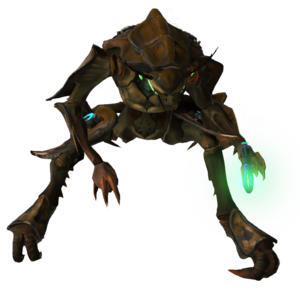
| |
| Biological overview | |
|
Latin name: |
Turpis rex |
|
Classification: |
Arthropod |
|
Diet: |
Carnivorous |
| Physical information | |
|
Avg. height: |
177.8 centimetres (5.83 ft)–205.8 centimetres (6.75 ft)[1][2] |
|
Avg. weight: |
|
|
Distinctions: |
Xeno-arthropodal morphology, beetle-like wings and exoskeleton. Flight-capable. Vestigial third pair of limbs on abdomen |
| Sociocultural information | |
|
Homeworld: |
|
|
Native Tier 4/Adopted Tier 2[3] | |
|
Notable individuals: |
|
|
Also known as: |
|
- "The flying Yanme'e, simply called the Drones by some, tend to a hivelike society, eusocial and separated by castes, each with its own tasks, subject to the will of a matriarchal queen."
- — From the Prophet of Clarity's Notes on the History of the Covenant[5]
The Yanme'e (Latin, Turpis rex, translated to "dishonorable king"[6]), referred to by some individuals as Drones[5] or Buggers,[4] are a race of sentient, carnivorous, flight-capable insectoids.[7] The Yanme'e were one of the species that composed the religious hegemony known as the Covenant, having become the body's second client species in 1112 CE.[3] In combat, the Yanme'e served as mechanics and soldiers, often using their ability to fly to carry out ambushes on enemies of the Covenant.[1]
History[edit]
The Yanme'e evolved from winged tree-dwelling arthropods on Palamok which had developed complex motor skills due to a flexible appendage made up of chitin that functioned as an opposable thumb. Eventually, the species developed higher levels of technology that ultimately led to the evolution of the Yanme'e species, due to societal coordination and cooperation.[7] The Forerunners noted that the Yanme'e were one of the few sapient, arthropodal species in the Milky Way galaxy that were competent enough to attain tool-making and technological skills.[3]
The Covenant[edit]
Eventually, the Yanme'e became an interstellar-faring, Tier-4 species. The Yanme'e first encountered the Covenant in the year 1112, while the Covenant was searching for Forerunner artifacts.[8] Initially, first contact was violent as the Yanme'e attempted to resist the alien invaders. Both sides took heavy casualties, but surprisingly,[3] it was the Covenant who fared worse in these battles due to the sheer amount of Yanme'e combatants.[1] However, the Covenant was unwilling to glass Palamok, as the San'Shyuum believed that Palamok's hives could be guarding Forerunner relics on the planet's surface. The San'Shyuum eventually found an effective way to communicate with the Yanme'e, and subsequently incorporated them into the Covenant by way of a treaty in an effort to prevent a prolonged war. Exploration of Palamok following the war provided no evidence of former Forerunner artifacts on the planet.[7] The San'Shyuum were quick to make use of their talent for repairing machinery, and employed them as mechanics on Covenant vessels.[9] An assembly of Yanme'e Hive Queens was formed, and they conscripted members of the drone caste into the Covenant military.[5]
The Yanme'e were one of the first species to make contact with humanity, on the human colony of Harvest in February 2525. They were first identified by the United Nations Space Command in the siege of Gladsheim, a small town on Harvest.[10] During the later fight on the Tiara, several Yanme'e killed the Huragok Lighter Than Some out of jealousy, causing the enraged Unggoy Deacon Dadab to slaughter them in revenge.[11]
After the Hierarchs declared war on humanity, Yanme'e were used as military combatants against UNSC forces. They were deployed during many major conflicts, including the Fall of Reach. During the Battle of Meridian, five or six Yanme'e were deployed by an Ceudar-pattern heavy corvette to finish off the survivors of a boat it had fired upon. Dorian Nguyen was able to kill one by slamming it with a guitar, crumpling its wings and sending the Yanme'e into the sea. Dorian managed to escape, but the Yanme'e slaughtered the hundreds of other people on the boat, including Dorian's friends and bandmates.[12]
During the Battle for Earth, they boarded orbital defense platforms along with other Covenant infantry.[13] When the Covenant made landfall in New Mombasa, the Yanme'e immediately established a large hive in the Superintendent's data center.[14]
During the Great Schism, the Yanme'e joined the San'Shyuum and the Jiralhanae.[15] Many were present as combatants during the Battle of Installation 00.[16]
Post-war[edit]
After the Human-Covenant War, many Yanme'e happily returned to their home system.[7] In 2554,[17] Many Yanme'e served in Tem'Bhetek's faction which attempted to use the Prototype Halo installation to destroy Sanghelios and the Sangheili. Many were killed by Rtas 'Vadum and Tul 'Juran after mortally wounding Tem'Bhetek with the remaining ones trying desperately to get to Boru'a'Neem to stop him from firing the miniature Halo again. They were killed when Tem destroyed the installation.[18] A large number of Yanme'e were present during the Battle of Draetheus V, serving in Merg Vol's Covenant.[19] Many more served in Jul 'Mdama's Covenant during the Battle of Installation 03.[20] For the most part, though, the Yanme'e mostly kept to themselves. The UNSC attempted a "don't poke the nest" policy toward the Yanme'e, attempting to avoid direct provocation while the UNSC focused on more immediate threats within the Covenant remnants. This policy was largely successful, though there were exceptions.[21]
When Cortana made her offer at the beginning of the Created conflict to the species of the galaxy, she did not include the Yanme'e in her list of species that she offered to fall under her protection. Upon hearing her message, Spartan Edward Buck noted her exclusion of the Yanme'e and didn't blame Cortana for excluding them as the Yanme'e creeped him out.[22][23]
Description[edit]
Anatomy and physiology[edit]
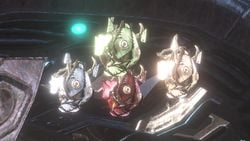
- "They're built kinda like beetles, and they flit around on twinned pairs of transparent wings that flap faster than you can see."
- — Edward Buck on the Yanme'e[24]
The Yanme'e share many similarities with Earth’s beetles and colonial insects. They are bipedal arthropods with hard exoskeletons made from a glossy chitinous substance, as well as two pairs of veined wings. These adaptations are a response to the high gravity of the Yanme'e homeworld, Palamok; their shells allow them to withstand hard falls, and the thick atmosphere of Palamok allows the winged Yanme'e to achieve just enough lift to perform fluttering leaps or naturally short bursts of flight.[25] In lower-gravity environments, Yanme'e are capable of using their wings for actual aerial maneuvering, but the weight of their exoskeletons prevent them from flying.[1] When the Covenant discovered this natural ability, scientists extended their flight capabilities by fixing gravity-dampening modules to their bodies. The module adjustment gave the Yanme'e the ability to take flight freely, and the species proved to be impressive fliers—particularly on worlds that had less gravity than Palamok.[7] Yanme'e are also impressively strong, despite their frail appearance. They can also be seen lifting their enemies off the ground to impressive heights.[24][26]
Unlike Earth insects, which have three body segments, Yanme'e have five: a head, a cephalothorax, a thorax, a pelvis, and an abdomen. The head supports a pair of feathery sensory antennae and luminous,[27] compound eyes that give the species adept vision.[28] The mouth consists of several sets of mandibles like those found on insects. Their hands sport opposable thumbs and three dextrous fingers. Yanme'e are "polydextrous", meaning that they are capable of using both their prehensile hands and feet to operate tools. The primary pair of legs are attached to a pelvis-like structure, while a smaller pair is attached to the abdomen. Although they generally use their primary set of limbs, Yanme'e can use this last set of limbs to operate weapons, grasp enemies, or latch on to ceilings and hang down vertically during sleep.[7][29] The Yanme'e have extremely sharp claws, located on all limbs,[30] that they can use to defend themselves if necessary, though they prefer to avoid close-quarters combat.[31] Yanme'e are a carnivorous species. Early in their history, the Yanme'e developed and bred types of feral livestock for food.[3]
There is essentially no apparent sexual dimorphism between male and female Yanme'e. Yanme'e exoskeletons are brightly colored, with different hues representing different functions or class.[7] Adolescent, or pupal, Yanme'e have translucent shells that glow luminescent yellow and orange. Almost nothing is known about the Yanme'e life cycle beyond the fact that the queen lays eggs. It is possible that the Yanme'e go through a complete metamorphosis including an egg, larva, pupae and adult stage, as many terrestrial insects and arthropods do.
To humans, Yanme'e have a natural musty odor.[32] Yanme'e blood is known to display a range of bioluminescent colors, which varies based on their diet.[33]
Intelligence[edit]
Yanme'e are a eusocial species, and therefore their intelligence is geared toward working in concert with large groups. They can accomplish tasks swiftly and efficiently when working together, and their knowledge of machinery is rivaled only by the Huragok. However, they lack individuality because of their hive lifestyle; their instincts and societal conditioning suppress creative thought and encourage total obedience to authority. They do not appear to experience higher emotions; it is known that they are able to feel jealousy, as seen when they killed the Huragok Lighter Than Some because he usurped their role as technician on board Rapid Conversion.[34] Yanme'e were allegedly incapable of feeling fear.[35] Despite their hive-minded nature, Yanme'e are still individually quite intelligent.[24]
Certain Yanme'e are unable to function in a hive society due to a form of personality disorder; these "Unmutuals" are capable of independent thought and tactical planning, although they tend to be extremely violent and aggressive. However, some of these Yanme'e appear to be very intelligent independently.[36] One individual was able to tamper with the inner circuitry of a UNSC Interrogator and allowed the device to translate the Yanme'e language into English in a matter of seconds.[37]
Culture[edit]
The Yanme'e are an insectoid species with a hive-minded social structure. Their society consists of reproductive queens, reproductive male drones and non-reproductive workers and soldiers. It is unknown if the soldier and worker caste is specific to one gender or another, but it is confirmed that the Yanme'e worker Hopalong was a male. Because of their eusocial nature, they can be extremely dogmatic and hive-minded,[28] a trait that may have made for an easy conversion into the Covenant hierarchy. The Hive Queen is the center of Yanme'e society and culture, to the point of her being the reason for the species' technological progress and advancement. This includes most major advances in science and other technology that typically results in emphasized protection and augmentation of the queen and the hives.[7]
Yanme'e obeyed the commands of the higher castes without question in the Covenant, but had little concept of religion and did not partake in social norms due to communication difficulties with other species. They referred to the San'Shyuum as "Queens", a remnant of their former hive lifestyle.[3] They did not interact with other Covenant member races except to trade resources and to serve in the military, where they typically serve as mechanics and repair crews on warships. Although highly skilled with technology, they aren't nearly as effective as Huragok; this has often brought them into a state of rivalry with Huragok, and in jealousy, the Yanme'e aboard Rapid Conversion even killed a Huragok named Lighter Than Some when it was assigned all of their former tasks.[34]
Role within the Covenant[edit]
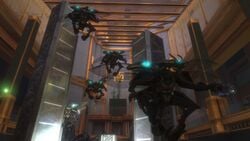
Yanme'e were initially conscripted into the Covenant only as mechanics and laborers. The Yanme'e were not as technically skilled as the Huragok, but they still proved to be incredibly competent mechanics and were efficient at general maintenance.[38] After years of serving in only custodial positions within the Covenant military, the Covenant had eventually developed numerous combat roles for the Yanme'e—largely due to their impressive flight capabilities.[7] They are typically used for surprise aerial ambushes and assaults, such as catching infantrymen off guard and diverting their attention so that their Covenant allies may gain the upper hand. The Yanme'e physiology made the species well-suited in infiltration roles.[35] Yanme'e are quite capable of using most light Covenant weaponry, and depending on their rank may wield plasma pistols, Needlers, and plasma rifles. The limb dexterity of the Yanme'e allows them to have competent aiming skills while in flight or while they are climbing over a structure. In addition, their speed and adept sight made the Yanme'e one of the most threatening infantry units in the entire Covenant military.[3]
Yanme'e were very territorial over the tasks they were assigned to. Although the Yanme'e would respect the Covenant's religious principles and would loyally obey their Sangheili and San'Shyuum commanders, they had no particular passion for the Covenant religion or desire to follow Covenant social normalities. Due to their lack of individual initiative, the Yanme'e remained low in the Covenant hierarchy, often commanded on the battlefield by Sangheili, Jiralhanae, or Kig-Yar.[31] Due to their low position, the Yanme'e were not represented on the High Council, but their interests were instead vetted by the Ministry of Concert.[39]
During large-scale ground engagements, Yanme'e have a tendency to entrench themselves and establish hives within enemy territory, as seen during the Fall of Reach and the conflicts in New Mombasa. This can make them a persistent threat, as the hives provide a constant supply of Yanme'e to reinforce occupying Covenant troops.[14]
Hives[edit]
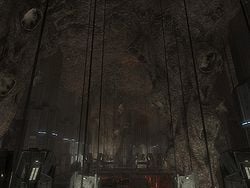
- "The first thing the Drones usually do when they set up in a place is build a hive made of spit, shit, and whatever else they can find lying around. It's how they mark a conquered area as their own."
- — Edward Buck[24]
Yanme'e have the ability to form fully functional hives at incredibly fast rates; during the Battle of New Mombasa, the Yanme'e generated a vast hive structure within the city's data center within hours. Hives are primarily constructed from a collection of mud, wood, and cellulose materials that is then mixed with Yanme'e excretions, which are formed into large stalactite-shaped structures. Yanme'e are able to establish hives in any location where sufficient raw material was available. However, hives are most commonly found underground or in vast jungle canopies, like the ones that cover a majority of Palamok's surface. The Yanme'e have also formed densely packed hives within the massive geological structures on Palamok's moons of Ka'amoti and Oquiu.[7] A defining characteristic of Yanme'e hives is that they radiate heat to their surroundings from vent-like openings, elevating the temperature over a large area.[14]
During their service with in the Covenant, Yanme'e that are deployed in combat roles are often ordered to create temporary, makeshift hives that allowed the rest of the Covenant military to easily access enemy territory. The hives served as Covenant strongholds for invading forces, often hidden within enemy territory on cavernous ceilings or underground.[7] Hives were established on Earth and Verge by the Yanme'e during the Human-Covenant War.[14][40] They would often use these hives to show that they had conquered an area on a world.[24]
Language[edit]
The Yanme'e language is a cacophony of high-pitched clicking or whining from the rubbing of their waxy, leaf-like wings.[41] They are also known to communicate sonically with loud shrieks and screeches, as well as through the use of pheromones.[1][7] Combat units will usually elect an attaché to serve as a translator, learning how the other races communicate and relaying the relevant information to the other Yanme'e. However, the attaché still does not socialize with other species, only learning enough about their allies to keep the other Yanme'e organized and informed.[31] By 2552, the Yanme'e language was still not completely translated by the Office of Naval Intelligence due to lack of information about the species. ONI's Interrogator translation software was only capable of poorly imitating Yanme'e clicks, but the output was unintelligible to the species.[37]
Castes[edit]
The Yanme'e race, inclining towards a hive-like and eusocial society, are divided by several castes. Most individuals fall into one of the three main, distinct Yanme'e castes: domestic, worker, or protector. The colorations of the Yanme'e shell will indicate its caste, and function within the caste. All castes are subservient to the Hive Queen.[5][7]
Hive Queen[edit]
- Main article: Yanme'e Queen
The Hive Queen is the central figure of a hive. Her primary role, as with ants and bees, is to propagate the species. The queen serves as the leader of the Yanme'e species. The Yanme'e lead an aggressively matriarchal society, with the other castes of the Yanme'e serving the queen and carrying out her orders to ensure the preservation of the hive. Yanme'e queens are responsible for the species reproduction and way of life, leading to the well-being of a queen being the uppermost importance of a hive.[5][7] The queen is substantially larger than the other castes of the race, with a distended, egg-producing abdomen and thick legs.[42]
Protector caste[edit]
Similar in function to the soldier caste within many Earth-based insect species, the protector caste was artificially merged with the worker caste by the Covenant following the Yanme'e's joining.[7] The protector caste was used as the Yanme'e military, within hive society and in the Covenant military. Within the protector caste, there appear to be many ranks. Minors are the most common form and have a very low position in Covenant society. Majors likely represent higher class in the protector caste, followed by Ultras. Protectors have most often been seen wielding Plasma pistols but may also carry Needlers.[43]
Worker caste[edit]
The worker caste is similar to the worker castes of similar function found within many eusocial Earth-based insect species. This caste was artificially merged with the protector caste by the Covenant, following the species' incorporation into the Covenant.[7] The caste is likely responsible for creating the hives and were likely employed by the Covenant in custodial positions. When the Covenant forced Yanme'e workers into combat positions on Rapid Conversion, several individuals became unusually clumsy and flustered; they became confused over the change in task.[28]
Other castes[edit]
Yanme'e males that are unable to fit in with the caste system or are born with destructive tendencies are known as Unmutuals, and are exiled from hives.[7] These are Drones unable to work in concert with the rest of the hive, and have in fact been known to go on rampages, destroying nests, smashing eggs, even murdering other adult Yanme'e. They are generally imprisoned to prevent them from communicating with the rest of the hive, and on at least one known occasion have been sent to mine helium-3 on planets captured by the Covenant. Yanme'e in these penal colonies are often guarded by Kig-Yar who may work them to death. On one occasion, a Kig-Yar actually removed the legs of a Drone whom SPARTAN Team Black named Hopalong. He helped the SPARTANs infiltrate their objective, deceiving them long enough to release the rest of the Drone prisoners.[36]
The domestic caste forms another large division within the Yanme'e caste structure, but its functions remain unknown. It is likely related to the wingless males that serve the queens.[42]
Homeworld and colonies[edit]
- Main article: Palamok
The Yanme'e homeworld is Palamok, an Earth-like planet but twice the size with over twice the gravity (2.2 G). Palamok is a flat and geographically featureless world, with little tectonic or volcanic activity.[3] The planet features a warm atmosphere and a stable environment.[25] The planet's high gravity led to the Yanme'e evolving with hard shells that are able to absorb a large amount of damage. Due to their planet's high gravity, the Yanme'e are only capable of short bursts of flight on Palamok, though they can fly quite well in 1.0 G environments.[2] The Yanme'e have several colonies throughout the Napret system, with Oquiu and Ka'amoti being the most prominent.[7]
Military structure[edit]
Yanme'e follow a similar ranking system to that used by the rest of the Covenant. A number of ranks are divided into two categories; infantry[44] and leader.[45] Infantry are usually ill-armed and armoured, instead deployed in vast swarms to overrun enemy defenses from the air. Leaders are usually equipped with energy shielding and larger weapons such as Okarda'phaa-pattern plasma rifles, and appear rarely on the battlefield to direct vast swarms of infantry.
Yanme'e rank progression is often signified by physiological changes within the Yanme'e individual itself, signifying that age is a factor into Yanme'e promotions. The youngest pupal Yanme'e glow with a soft yellow light, and are rarely seen outside of the hives in which they grow.[46] These pupal-stage Yanme'e are extremely susceptible to gunfire, indicating that their carapaces are incapable of fending off attacks until fully-grown.[47] Once out of the pupal stage, Yanme'e continue to grow, with the carapaces of Captains and Captain Majors becoming more protective and ornate[47] while Majors and Ultras see the growth of "horns" on the head[48] - though some-observed Majors and Ultras exhibit the same lack of morphological change as a regular Minor.[47][49]
| Rank | Image | Description |
|---|---|---|
| Yanme'e Leaders | ||
| Yanme'e Queen | 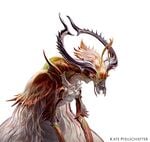
|
Queens are the leaders of Hives, responsible for the birth of new members of the Swarm. |
| Hiveward | 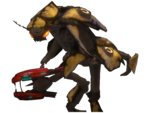
|
The highest-known rank of the Yanme'e, Hivewards command vast numbers of Yanme'e and have been rarely seen on the battlefield outside of a hive. |
| Captain | 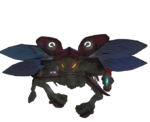
|
The lowest-known rank of Yanme'e leader, Captains regularly appear on the battlefield to command large units of infantry. |
| Yanme'e Infantry | ||
| Ultra | 
|
An Ultra is considered the highest regular military rank for the species. They are distinguished by their blue and cyan or silver-white exoskeletons, along with paired forked horn-like structures on their head and cephalothorax. |
| Major | 
|
Majors can be distinguished by a light blue[47] or brown-red exoskeleton and set of three horns[48], though some may also appear identical to the Minors below them.[49] They typically command a small unit of 2-3 Minors.[47] |
| Minor | Drone Minors are the lowest of the Drone ranks, signified by their lack of extra horns or carapace - and green colouration. | |
| Pupa | 
|
These Yanme'e are pupa, and undergoing transformation. They are extremely weak and emit a soft glow; they are rarely seen outside of a hive. |
Production notes[edit]
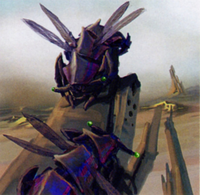
The Drones have had a number of cut variants over the years. During the development of Halo: Combat Evolved, one such cut unit was the Drone Engineer. At this stage in development, the Drone Engineer was envisioned to take the role of the Huragok featured in later media; with early designs depicting the Engineer as a fusion of insectoid and cybernetic elements. A number of designs were produced along this theme, eventually evolving into the Engineer design ultimately cut from the game.[50] This design was later re-considered for Halo 2, in which the Drone Engineer concept was brought back as a new flying infantry unit, while the "gas-bag" design of Engineer that was modelled (though not implemented) in Combat Evolved was also canonised as a separate entity in Halo: First Strike, Halo Wars and Halo 3: ODST.
The drones went on to recieve considerable expansion in ODST, seeing five rank variants introduced and a level set inside one of the Drones' hives. The same year's Halo Wars also intended to introduced Drones as a playable unit, though this was ultimately cut from the game. The "Recon Drone" would have served as the Covenant's scout unit, with no attack abilities. Another Drone unit was also cut from Halo 4; this drone was intended to be a sniper unit and was fully-concepted - though never implemented in the final game.
Trivia[edit]
| Language | Equivalent |
|---|---|
French |
Les Drones in all media. Les Vermines (nickname) in Halo: Reach's manual. |

|
See our gameplay information related to Yanme'e on its gameplay page. |

|
Browse more images in this article's gallery page. |
- The nickname "buggers" is likely a reference to the Formic race in the Orson Scott Card novel Ender's Game. Additionally, the Drones' native name, Yanme'e, could be based on the Japanese 蜻蜓 (yanma), meaning "large dragonfly".
- The weight of a Drone averages around 77 kilograms, a reference of Bungie's love of the number 7.
- During concept stages for Halo 3, the Yanme'e were planned to have an animation in which they would carry away a Marine.[51] This animation was cut from the final game but one does pick up a Marine for a short time at the beginning of the first swarm attack in Crow's Nest.
- In Halo: Reach, when Drones are killed with a headshot, they explode, leaving behind only limbs.
- In Halo: Reach, Drones are not encountered in Firefight mode, unlike Halo 3: ODST.
- On the Bungie.net game stats for Halo: Reach, Yanme'e are referred to as "Buggers" rather than their more common nickname, "Drones".
- In Halo 3: ODST, on the level Data Hive, you can find multiple Yanme'e eating the corpses of deceased police officers. This is the only time we are presented with a Covenant species actively eating human flesh in any Campaign level, albeit multiple claims that numerous species among the Covenant, predominantly Jiralhanae, consume human flesh.
Gallery[edit]
Development images[edit]
Concept art of the "Drone Engineer" for Halo 2.
An animation cut from Halo 3.
A sculpt of a Yanme'e, ultimately unused, intended for inclusion in Halo Wars.
Concept art of the Yanme'e for Halo Legends: Homecoming.
Unused concept art for Yanme'e snipers for Halo 4.
Screenshots and artwork[edit]
A group of Yanme'e flying forward in Halo 2 for Windows Vista.
A group of Yanme'e attempting to hijack a Karo'etba-pattern Ghost in Halo 3.
Yanme'e in Halo: Bloodline.
A Yanme'e in Halo: Reach.
Yanme'e fighting Spartan Edward Davis in Halo: Spartan Assault.
A Yanme'e in Halo 2: Anniversary.
A Yanme'e in Halo: Spartan Strike.
Yanme'e attacking Atriox and Decimus on the cover of Halo: Rise of Atriox#3.
List of appearances[edit]
|
|
Sources[edit]
- ^ a b c d e f Halo Encyclopedia (2009 edition), pages 148-149
- ^ a b c Halo: The Essential Visual Guide, page 51
- ^ a b c d e f g h Halo 3, Bestiarum
- ^ a b c d Halo 2, Conversations from the Universe
- ^ a b c d e Halo: Broken Circle, page 186
- ^ halo.bungie.org: Bestiarum Latin names translated
- ^ a b c d e f g h i j k l m n o p q r Halo Waypoint: Yanme'e
- ^ Halo Encyclopedia: The Definitive Guide to the Halo Universe, page 159 (2011 edition)
- ^ Halo Encyclopedia: The Definitive Guide to the Halo Universe, page 31
- ^ Halo: Contact Harvest, page 286
- ^ Halo: Contact Harvest
- ^ Halo: Battle Born, Chapter 4
- ^ Halo 2, campaign level, Cairo Station
- ^ a b c d Halo 3: ODST, campaign level, Data Hive
- ^ Halo 2, campaign level, Uprising
- ^ Halo 3, campaign level, The Ark
- ^ Halo Waypoint: Catalog Interaction (Page 43)
- ^ Halo: Shadow of Intent
- ^ Halo: Spartan Assault
- ^ Halo: Spartan Strike
- ^ Halo: New Blood, Chapter 16
- ^ Halo 5: Guardians, campaign level Guardians
- ^ Halo: Bad Blood, page 5
- ^ a b c d e Halo: New Blood, pages 69-70 (Google Play edition)
- ^ a b Halo Encyclopedia: The Definitive Guide to the Halo Universe, page 309 (2011 edition)
- ^ Halo 3, campaign level, Crow's Nest
- ^ Halo: Contact Harvest, page 202
- ^ a b c Halo: Contact Harvest, page 267
- ^ Halo 3: ODST
- ^ Halo: Contact Harvest, page 371
- ^ a b c Halo Encyclopedia: The Definitive Guide to the Halo Universe, page 159
- ^ Bungie.net, Halo 3 ODST : Field Guide - Drone (Retrieved on May 25, 2013) [local archive] [external archive]
- ^ Halo: Official Spartan Field Manual, page 170
- ^ a b Halo: Contact Harvest, page 369
- ^ a b Bungie.net: Stats
- ^ a b Halo: Evolutions, "Blunt Instruments", page 26
- ^ a b Halo: Evolutions, "Blunt Instruments", page 13
- ^ Halo Encyclopedia: The Definitive Guide to the Halo Universe, page 121
- ^ Halo: Contact Harvest, page 150
- ^ Halo: Evolutions, "Blunt Instruments", page 21
- ^ Halo: Contact Harvest, page 311
- ^ a b Halo: Contact Harvest, page 381
- ^ Halo: Reach
- ^ Bungie.net, Halo 3: ODST Stats (Retrieved on Jul 23, 2019) [archive]
- ^ Halo: The Essential Visual Guide, page 51
- ^ Halo 3: ODST Official Strategy Guide, page 25
- ^ a b c d e Halo 3: ODST
- ^ a b Halo: Reach
- ^ a b Halo 3
- ^ The Art of Halo: Creating a Virtual World, page 46
- ^ Bungie.net: A Certain Sense of Movement
| |||||||||||||||||||||||||
